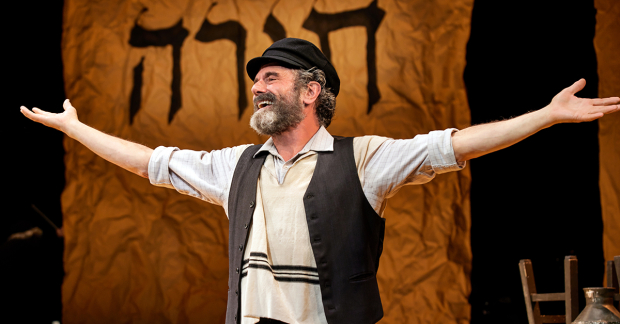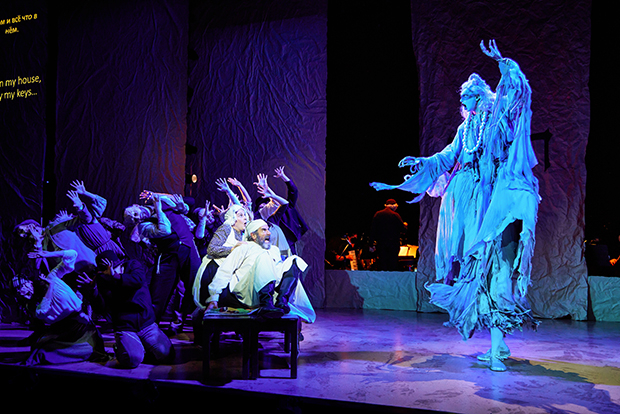Review: Yiddish Fiddler on the Roof Returns for a Second Victory Lap
Steven Skybell and company reunite at New World Stages for a 2022 holiday run of Joel Grey’s award-winning production.
The National Yiddish Theatre Folksbiene has revived its acclaimed 2018 production of Fiddler on the Roof in Yiddish, directed by Joel Grey, for a 2022 holiday season run at New World Stages through January 1. We reviewed the musical twice, during its initial run at the Museum of Jewish Heritage and after its transfer to Stage 42. Here are excerpts from both reviews.

(© Jeremy Daniel)
A Fiddler on the Roof performed completely in Yiddish? Sounds meshugge, no? On the one hand, the language is the native tongue of the Sholem Aleichem source material. On the other, Jerry Bock and Sheldon Harnick's score and Joseph Stein's English-language script is beloved by generations. But the National Yiddish Theatre Folksbiene's transcendent new production of the classic musical brings us closer to Tevye, Golde, and the good, pious citizens of Anatevka than we've ever been before.
Fiddler Afn Dakh, directed by Joel Grey, was created in 1965 by Shraga Friedman. Friedman, an actor-translator who immigrated to Israel from Warsaw at the start of World War II, presents a version of the script and score that captures the essence of the original while not being slavishly literal. He quotes directly from Aleichem's "Tevye the Dairyman" stories in order to retain the emotional texture of Stein's book when there's no direct word-for-word conversion. The spirit of Harnick's lyrics is intact, even if, for the purposes of scansion, "If I Were a Rich Man" becomes "Ven Ikh Bin a Rotshild," or "If I Were a Rothschild," a common Yiddish expression that means the same thing.
Grey's production takes place on a near-empty stage, where tables and chairs do all the physical work. The largely unadorned set by Beowulf Boritt and plain shtetl costumes by Ann Hould-Ward allow the language — written, spoken, and played — to shine. Even if you don't understand what the actors are saying, once the orchestra strikes up those familiar melodies, you won't even need to look at the supertitles.

(© Jeremy Daniel)
As a result, this Fiddler brings us closer to the citizens of Anatevka than ever before, removing itself from the hoary rituals of musical comedy and shifting in tone to become a wrenching drama. The plight of Tevye (Steven Skybell), who must come to grips with a changing world as his three eldest daughters (Rachel Zatcoff as Tsaytl, Stephanie Lynne Mason as Hodl, and Rosie Jo Neddy as Khave) break with custom and marry for love, while the specter of politically motivated, anti-Jewish violence hangs over their heads, has never seemed more authentic than it does in its mamaloshen ("mother tongue"). Combined with Grey's majestically simple, actor-friendly staging and Skybell's awe-inspiring Tevye, this production proves that sometimes all you need to make a connection is sterling emotional clarity.
This lucidity is present in all of the performances. Rachel Zatcoff's Tsaytl is a study in presence, her heart always on her sleeve as she stands up to her parents so she can marry Motl Kamzoyl (Ben Liebert), a lowly tailor, instead of the wealthy butcher Leyzer-Volf (Bruce Sabath). Liebert isn't as big a Motl as we've seen in the past; in fact, he's near tears with pride and happiness at the end of his sensitive "Miracle of Miracles" ("Nisimlekh-Veniflo'oys").
You will be, too, and often in this production, thanks to the glorious voices of the ensemble, the lush orchestra under the baton of Zalmen Mlotek, and the crystal-clear sound design of Dan Moses Schreier. When Tevye and Golde (the warm Jennifer Babiak) share a quiet moment with "Do You Love Me?," performed here as a genuinely difficult conversation instead of a moment of charming bickering, it is particularly moving.
It helps that Skybell's Tevye is so far from what we're used to, with actions that are infused with the very human quality of fear. Frightened of change and what it means for him, his family, and his beliefs, this Tevye must gather all the courage he has and bravely dive into a world where the rewards and consequences are altogether unknown. In doing so, Skybell unlocks the human being inside a character that in the past has been played as a comedic blowhard. Like the production itself, his portrayal is unquestionably beautiful, thoroughly devastating, and completely satisfying.











